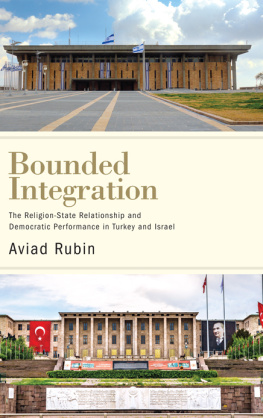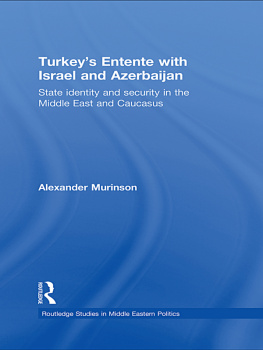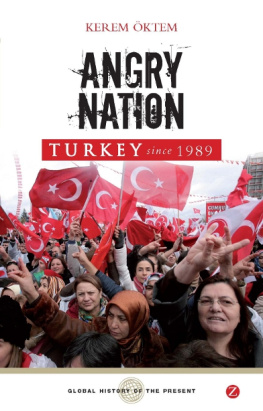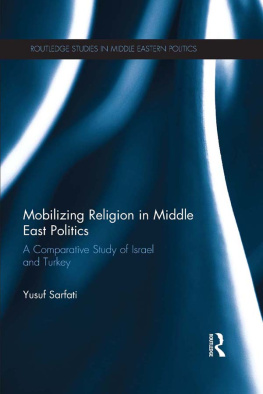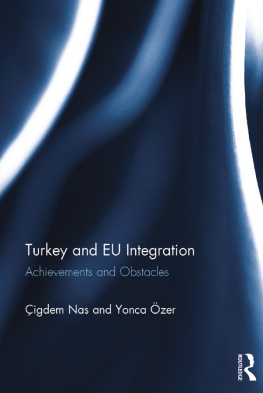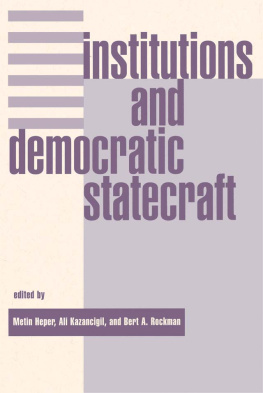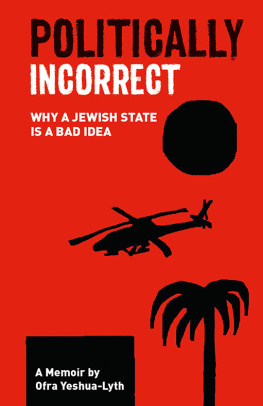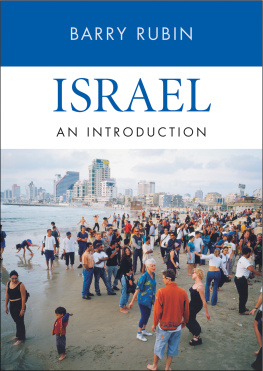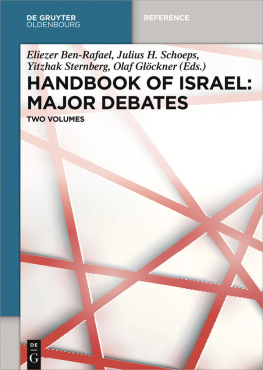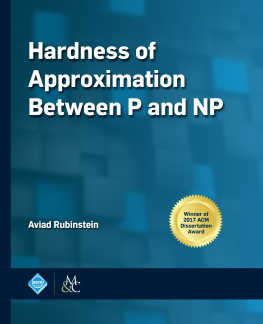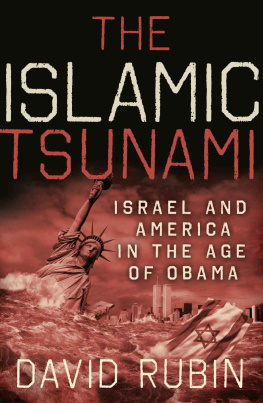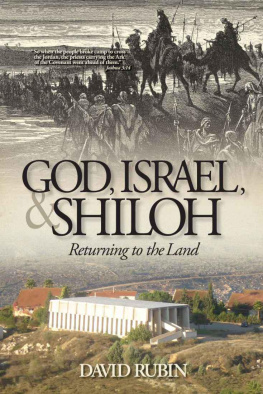Bounded Integration
SUNY series in Comparative Politics
Gregory S. Mahler, editor
Bounded Integration
The ReligionState Relationship and
Democratic Performance in Turkey and Israel
Aviad Rubin
Published by State University of New York Press, Albany
2020 State University of New York
All rights reserved
Printed in the United States of America
No part of this book may be used or reproduced in any manner whatsoever without written permission. No part of this book may be stored in a retrieval system or transmitted in any form or by any means including electronic, electrostatic, magnetic tape, mechanical, photocopying, recording, or otherwise without the prior permission in writing of the publisher.
For information, contact State University of New York Press, Albany, NY
www.sunypress.edu
Library of Congress Cataloging-in-Publication Data
Name: Rubin, Aviad, author.
Title: Bounded integration : the religion-state relationship and democratic performance in Turkey and Israel / Aviad Rubin.
Description: Albany : State University of New York, [2020] | Series: SUNY series in comparative politics | Includes bibliographical references and index.
Identifiers: LCCN 2020023191 (print) | LCCN 2020023192 (ebook) | ISBN 9781438480770 (hardcover : alk. paper) | ISBN 9781438480787 (ebook)
Subjects: LCSH: Religion and stateTurkeyHistory. | Religion and stateIsraelHistory. | Islam and stateTurkeyHistory. | Judaism and stateIsraelHistory. | DemocracyTurkeyHistory. | DemocracyIsraelHistory. | DemocracyReligious aspectsIslam. | DemocracyReligious aspectsJudaism.
Classification: LCC BL65.S8 R83 2020 (print) | LCC BL65.S8 (ebook) | DDC 322/.109561dc23
LC record available at https://lccn.loc.gov/2020023191
LC ebook record available at https://lccn.loc.gov/2020023192
10 9 8 7 6 5 4 3 2 1
Contents
Illustrations
Figures
Tables
Acknowledgments
This book is the product of a challenging, decade-long journey. Along the way, I was assisted, guided, and inspired by many, to whom I am deeply thankful. First and foremost, I express my gratitude to Phil Oxhorn, a true mentor and an academic role model who guided me skillfully throughout this project and helped in crystallizing my ideas. I also thank Harold Waller and Juliet Johnson for providing thoughtful advice and support whenever needed. It is a particular honor to thank Michael Brecher, a scholar of rare quality who has been a source of inspiration since my studies at McGill University and to today. The Department of Political Science at McGill provided an unparalleled stimulating intellectual environment. In particular, I thank my peers in the departmentDaniel Wolski, Francoise Montambault, and Kate Korycki, who were supportive, intellectually invigorating, and good company whenever the weight of the task became too heavy.
In my current academic home, the University of Haifa, I have been blessed with terrific colleagues. Special thanks go to my good friend Doron Navot, who read parts of this book and gracefully offered insights that were invaluable in improving the theoretical framework. I am also indebted to my colleagues at the School of Political Sciences, Daphna Canetti, Udi Eiran, Asad Ghanem, Gal Gerson and Annabel Herzog, who provide a supportive scholarly environment.
The empirical part of this research was conducted in two countries that are a great deal more than simply case studies for me. Israel is my homeland, and this research was motivated by a personal commitment to make it a better and more just place. I was fortunate to be hosted at the Gilo Center for Democracy and Civic Education at the Hebrew University in Jerusalem, which provided a pleasant working environment during my field research.
During this research project, I came to know Turkey in an intimate way. Turkey is one of the most fascinating places in the world, and its welcoming people made my research there a unique and unforgettable experience. I express special thanks to Canan Aslan of the Middle East Technical University for her tireless help in organizing contacts and interviews, and to my dedicated friend and assistant Onur Kara for his invaluable work. I am also thankful to my friends Yusuf Sarfati, Sultan Tepe, and Goke Yurdakul, who helped me refine my understanding of contemporary trends in Turkish politics. It is hard for me to witness current affairs in Turkey. I wish this beautiful country and its courageous people better times soon.
This research would not have been possible without generous funding from the Steinberg Fellowship of the Jewish Federation in Montreal, the Rabin Scholarship from the Canadian Friends of the Hebrew University, the Sleyman Demirel Scholarship from the Moshe Dayan Center for Middle Eastern and African Studies, and the Azrieli Foundations International Postdoctoral Fellowship. I thank them all. Special gratitude is due the Israel Institute, which generously supported the writing of this book by providing funding for visiting faculty positions at the University of Chicago and University of Toronto, and for providing a publication grant that helped bring this project to completion.
I am truly indebted to Meira Ben-Gad, a gifted editor, who often knew before me how best to elucidate my arguments and immensely enhanced the overall quality of this manuscript.
Finally, I thank my family. To my parents, who worked hard and showed me the way; my brothers, Ofir and Amir, and their families; my three adorable sons, Shai, Alon, and Omri, who are the chief source of joy in my life; and Shelly, my partner and dearest friend in the whole world, without whom this road would have been much harder. Shelly, this book is for you.
Introduction
This book has three main goals. First, it repudiates the commonly held assumption that the separation of religion from state affairs is a necessary condition for a well-functioning democracy. With a structured comparison of the experiences of Turkey and Israel, the chapters show that when popular preferences support the inclusion of religion in the regime, failing to do so may work against democratic performance. Conversely, the integration of religion in the state within certain bounds, if this policy accords with popular preferences, may have a positive influence on democratic governance.
Second, the analysis offered herein relies on a novel theoretical framework for explaining how varying levels of religious recognition by the state affect democratic performance. This framework provides a foundation for understanding the initial recognition given to religious content and actors in emerging regimes and changes in the statereligion relationship over time. Most important, it introduces conceptual boundaries within (or outside) which the statereligion relationship will support (or undermine) democratic performance. This is an important contribution to the literature on religion in politicsarena where, despite growing interest and the emergence of more nuanced postsecular perspectives, most research is still preoccupied with the belief that religious integration in politics negatively affects democratic regimes.
Third, this book aims to shed additional light on the nature of political modernization projects by assessing the applicability of lessons learned from Turkey and Israel to other polities seeking to democratize while confronting public demand for official recognition of religion. This question is most timely in Middle Eastern societies that seek formulas for sustainable governance following the Arab Spring, but it may prove helpful in other regions of the world and for other types of collective identity.


